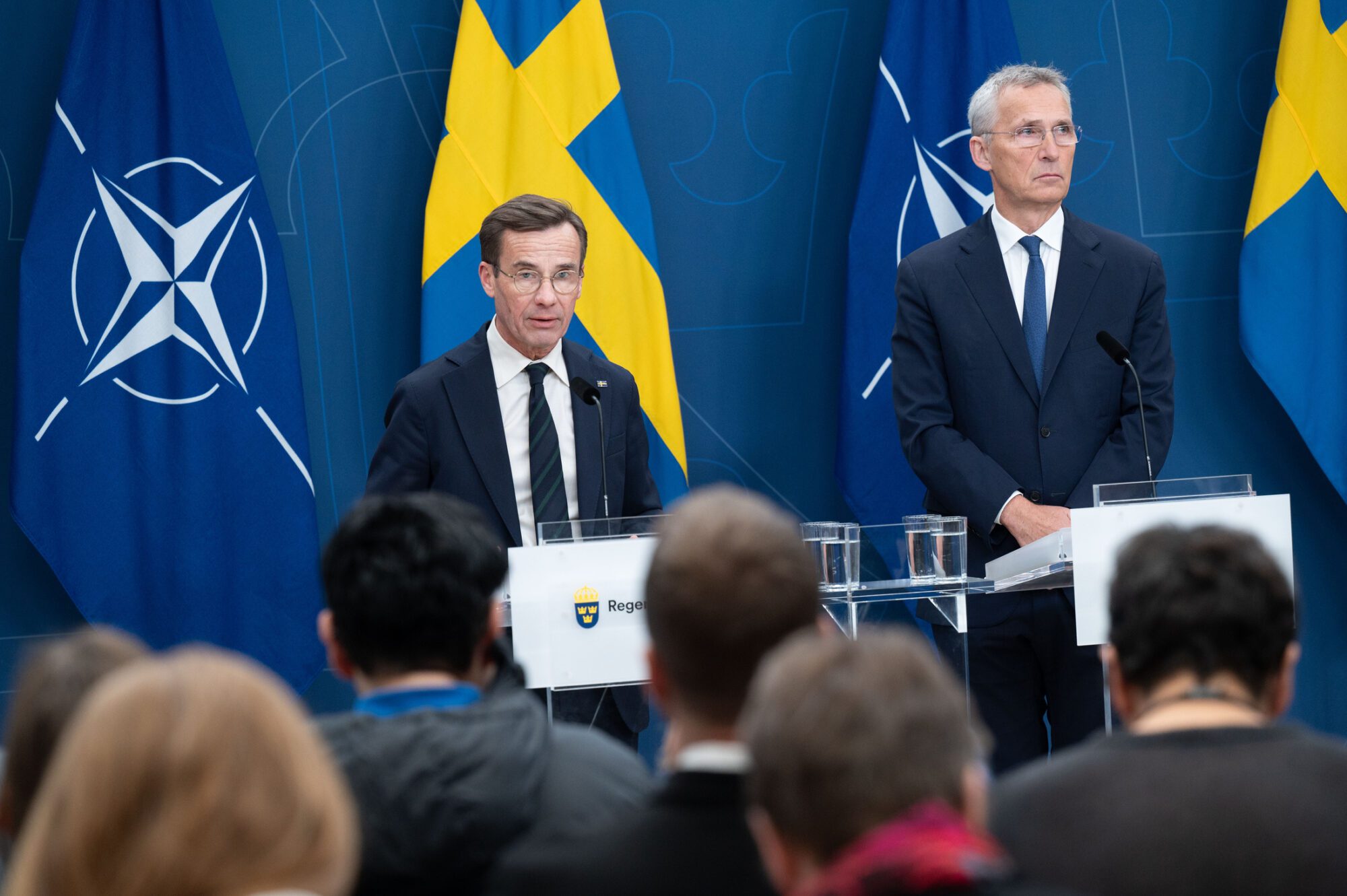
Swedish Prime Minister Ulf Kristersson (left) and NATO Secretary-General Jens Stoltenberg (right) in Stockholm, October 24th, 2023.
Photo: NATO, October 24th, 2023.
Turkish President Recep Tayyip Erdoğan has signed Sweden’s NATO accession protocol, giving a green light for the Grand National Assembly (Turkey’s parliament) to start the approval procedure, Ankara announced on Monday, October 23rd. This does not mark the end of the saga, however, as there is “no exact timeline” for the Turkish vote and ratification, but at least NATO is confident that Hungary will “not delay the process.”
The Protocol on Sweden's Accession to NATO was signed by President @RTErdogan on October 23, 2023 and referred to the Grand National Assembly of Türkiye.
— Presidency of the Republic of Türkiye (@trpresidency) October 23, 2023
Swedish Prime Minister Ulf Kristersson hailed the move on X, saying that Sweden was “looking forward to becoming a member of NATO.”
Standing next to Kristersson, NATO Secretary-General Jens Stoltenberg also welcomed the development during their joint press conference on Tuesday in Stockholm.
After more than a year of stubbornly blocking Stockholm’s NATO membership bid—mainly because of the Swedish refusal to extradite Kurdish activists wanted on terrorism charges back home—President Erdoğan finally agreed to lift his veto during the defense alliance’s Vilnius Summit in July.
However, Erdoğan’s “yes” wasn’t given away easily. Ankara presented a 17-point shopping list of demands for Stockholm to fulfill before ratification, which included creating increased security and counter-terrorism cooperation frameworks and supporting Turkey’s EU accession bid, as well as banning Quran burnings and pro-Kurdish demonstrations—even if that means encroaching on the Swedes’ precious freedom of expression.
“Sweden has fulfilled its commitments,” Stoltenberg said at Tuesday’s press conference, arguing that there should be no more obstacles to full Turkish ratification. “Sweden has amended its constitution, changed its laws, expanded counter-terrorism cooperation, and resumed arms exports to Turkey.”
However, while Sweden did indeed amend its fundamental law by introducing the new “Terrorist Crime Act” that increases the severity of the punishment for aiding or supporting terrorism-related activities, it still hasn’t explicitly banned pro-Kurdish activism or Quran burnings and has not extradited Kurdish PKK members who are Swedish citizens, as Turkey has requested.
Nonetheless, what matters is that the Swedish NATO accession’s parliamentary approval process has begun, although it all could be smoke and mirrors as it’s still unclear when to expect Turkish lawmakers to put the question to a vote. Stoltenberg spoke to Erdogan over the phone this weekend but said the president provided “no exact timetable.”
Despite no official deadline, Swedish Foreign Minister Tobias Billström believes Sweden will become a full member of NATO during the bloc’s foreign ministers’ upcoming meeting on November 28-29.
On the other hand, there is no certainty that the vote is going to pass either. While Erdoğan’s Justice and Development Party (AKP) holds the government with its 263 seats, it still relies on the support of 50 MPs of the Nationalist Action Party (MHP)—currently in a confidence-and-supply agreement—to reach a majority in the 600-seat National Assembly.
In practice, this means that if the opposition parties decide they won’t support Sweden’s accession and MHP joins them, the ruling AKP will not have the power to pass the measure, regardless of any deals made with Erdoğan.
And this is exactly what MHP leader Devlet Bahçeli threatened immediately after the Vilnius Summit, vowing to veto the ratification unless all PKK members are extradited by Sweden, “a country that threatens our national existence, embraces bloody terrorist organizations, and tolerates their recruitment in its own capital.”
The danger is not as great as it seems, however, because there is no real chance that the parliament’s largest opposition block, Kemal Kılıçdaroğlu’s National Alliance would vote against Swedish NATO membership, given the party’s well-known Euro-Atlantic commitments.
Apart from Turkey, there is one other country standing between Sweden and NATO. The Hungarian parliament still has not voted on the ratification, but Budapest has repeatedly promised it would drop all resistance once Turkey relents.
During the press conference, Kristersson said that he had been assured personally by Prime Minister Viktor Orbán that there wouldn’t be any delay, while Stoltenberg was also convinced of Hungary’s imminent support. “Hungary has stated several times that it won’t be the last to ratify,” the NATO chief said. “And since it is one of two countries that had not ratified yet, we can be certain that Hungary will not delay the process.”
